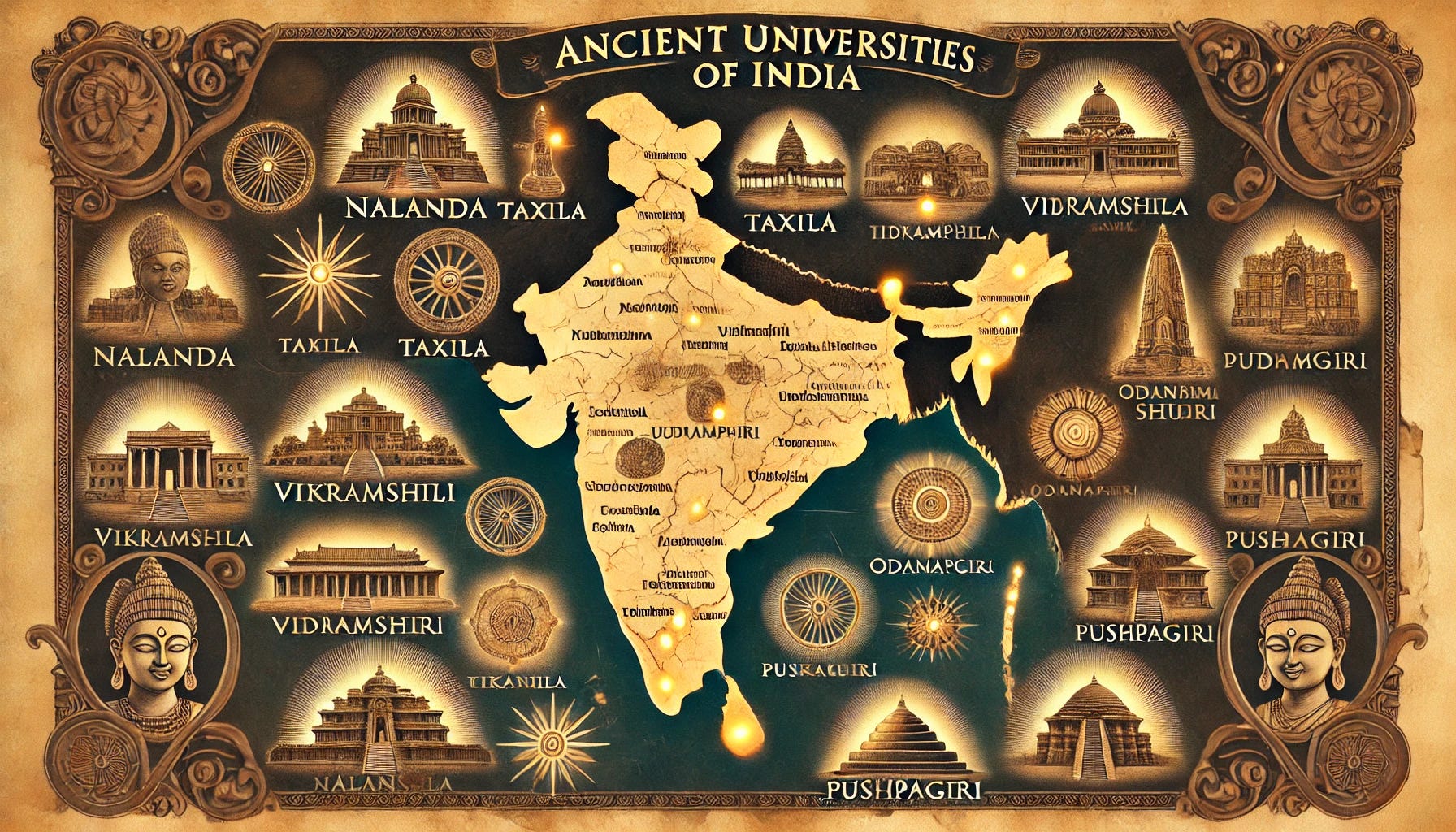India, known as Bharat, has been the cradle of knowledge and learning for millennia. From the times of the Vedas to the medieval period, India was home to structured educational institutions, where students from across the world came to study subjects like science, mathematics, astronomy, medicine, philosophy, literature, and administration.
Bharat’s status as Vishwa Guru (World Teacher) was built upon these great universities, which attracted scholars from China, Korea, Tibet, Persia, and Greece. These institutions not only preserved and expanded knowledge but also contributed to global scientific and philosophical advancements.
Here’s a detailed look at 25 Ancient Universities of India, their history, subjects, and contributions:
1. Nalanda University
Location: Bihar
Specialization: Buddhist studies, logic, astronomy, medicine, and arts
Significance:
Considered one of the greatest centers of learning in ancient history.
Attracted 10,000 students and 2,000 teachers from China, Korea, Tibet, and Central Asia.
Had a vast library, destroyed in 1203 AD by Bakhtiyar Khilji.
2. Taxila University
Location: Present-day Pakistan
Specialization: Medicine, law, arts, military science, and administration
Significance:
One of the oldest universities in the world, dating back to 6th Century BC.
Chanakya (Kautilya), Panini (Sanskrit grammarian), and Jivaka (Buddha’s physician) studied here.
Declined after Huna invasions (5th Century AD).
3. Vikramshila University
Location: Bihar
Specialization: Buddhist studies, Tantra, logic, and grammar
Significance:
Founded by King Dharmapala (Pala Dynasty).
Known for Vajrayana Buddhism and advanced Buddhist education.
Had six colleges with specialized subjects.
Destroyed in 1203 AD by Bakhtiyar Khilji.
4. Odantapuri University
Location: Bihar
Specialization: Buddhist scriptures, literature, and logic
Significance:
Founded by King Gopala I (Pala Dynasty).
Estimated to have had 1,000 students at its peak.
Considered a precursor to Nalanda and later merged into its academic network.
5. Mithila University
Location: Bihar
Specialization: Nyaya (Logic), Vedic studies, and judicial education
Significance:
Known for rigorous oral traditions and deep intellectual debates.
Played a crucial role in preserving Hindu legal traditions.
6. Vallabhi University
Location: Gujarat
Specialization: Religion, law, medicine, economics, and agriculture
Significance:
Flourished under the Maitrak dynasty.
Provided education in both Buddhist and Brahmanical knowledge systems.
Served as a leading center for state administration studies.
7. Sringeri Matha
Location: Karnataka
Specialization: Advaita Vedanta, Sanskrit, and Vedic studies
Significance:
Founded by Adi Shankaracharya in the 8th century AD.
One of the four primary Advaita Vedanta mathas in India.
8. Kanchipuram University
Location: Tamil Nadu
Specialization: Tamil literature, Shaivism, Vaishnavism, and Buddhist studies
Significance:
Known as the Varanasi of the South.
Adi Shankaracharya and Bodhidharma studied here.
9. Pushpagiri University
Location: Odisha
Specialization: Buddhist and Jain education
Significance:
Spread across three campuses – Lalitgiri, Udayagiri, and Ratnagiri.
Major center for Mahayana Buddhism and early Jain traditions.
10. Ujjayini (Ujjain) University
Location: Madhya Pradesh
Specialization: Astrology, astronomy, and mathematics
Significance:
Home to Varahamihira and Brahmagupta.
Major center for astronomy and Vedic sciences.
11. Krishnapur University
Location: West Bengal
Specialization: Sanskrit, philosophy, and sciences
Significance:
Key institution for language studies and ancient Indian texts.
12. Nellore University
Location: Andhra Pradesh
Specialization: Religion and administration
Significance:
One of the early centers of Hindu and Jain governance education.
13. Somapura University
Location: Bangladesh
Specialization: Buddhist scriptures and philosophy
Significance:
Built by King Dharmapala of the Pala dynasty.
One of the largest Buddhist monasteries of its time.
14. Amravati University
Location: Andhra Pradesh
Specialization: Buddhist and Jain studies
Significance:
Important hub for Buddhist sculpture and artistic traditions.
15. Nagarjunakonda University
Location: Andhra Pradesh
Specialization: Buddhist metaphysics and monastic training
Significance:
Named after Acharya Nagarjuna, one of India’s greatest Buddhist philosophers.
16. Ratnagiri University
Location: Odisha
Specialization: Mahayana and Vajrayana Buddhism
Significance:
Played a role in the spread of Buddhism to Southeast Asia.
17. Malkapuram University
Location: Andhra Pradesh
Specialization: Religious sciences
Significance:
Important Hindu and Jain monastic center.
18. Trissur University
Location: Kerala
Specialization: Art, literature, and astrology
Significance:
Key institution for classical Indian arts and temple architecture.
19. Vijayapura University
Location: Karnataka
Specialization: Religious and astrological studies
Significance:
Home to several renowned astrologers and philosophers.
20. Kadayar University
Location: Tamil Nadu
Specialization: Tamil literature and arts
Significance:
Center for Tamil literary studies and temple-based education.
21. Manyaketa University
Location: Karnataka
Specialization: Religious and philosophical studies
Significance:
Important center for Jain, Hindu, and Buddhist traditions.
22. Udipi Matha
Location: Karnataka
Specialization: Dvaita Vedanta and Sanskrit studies
Significance:
Founded by Madhvacharya, propagator of Dvaita philosophy.
23. Kannur University
Location: Kerala
Specialization: Literature and astrology
Significance:
Famous for Hindu astrology and temple studies.
24. Anuradhapura University
Location: Sri Lanka
Specialization: Buddhist Theravada studies
Significance:
Key institution for monastic and Pali literature studies.
25. Kanthalloor Shala
Location: Tamil Nadu
Specialization: Science, mathematics, and medicine
Significance:
Known as the Nalanda of the South.
The Enduring Legacy of Ancient Indian Education
These ancient universities shaped India’s intellectual, scientific, and spiritual legacy. Though many were destroyed by foreign invasions, their teachings and contributions continue to influence modern thought. Reviving this spirit of learning can position India as a global leader in education once again.


